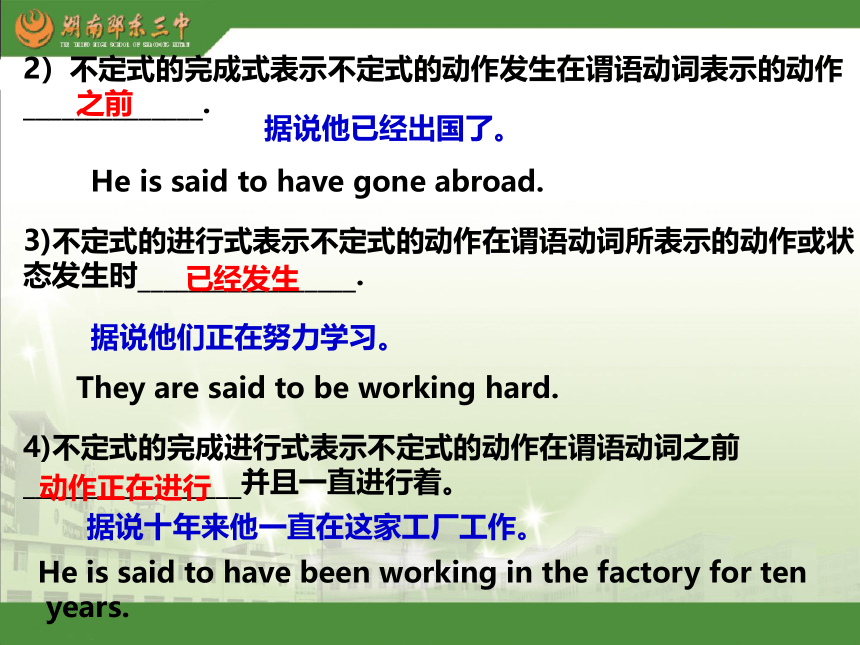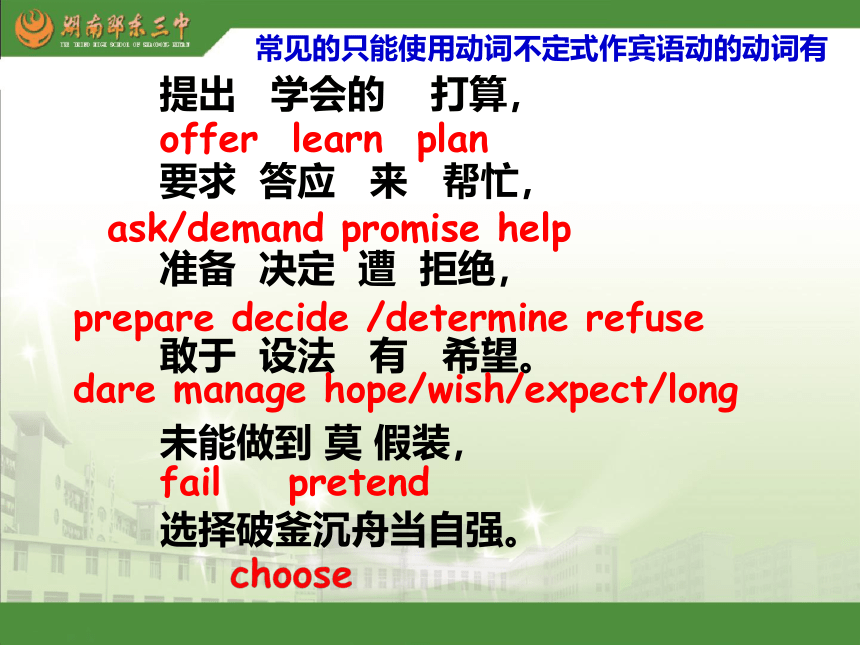模块5 Unit 1 Getting along with others Grammar and usage(1) 课件(18张PPT)
文档属性
| 名称 | 模块5 Unit 1 Getting along with others Grammar and usage(1) 课件(18张PPT) |

|
|
| 格式 | zip | ||
| 文件大小 | 5.1MB | ||
| 资源类型 | 教案 | ||
| 版本资源 | 牛津译林版 | ||
| 科目 | 英语 | ||
| 更新时间 | 2020-02-26 00:00:00 | ||
图片预览







文档简介
(共18张PPT)
M5 U1 Infinitive
不定式
1._______________ 的不定式
2._______________的不定式
(1)在________________________________________________之后,常接省to的不定式。
Why not _______(go) shopping with me?
You had better _______(go) home now.
I would rather ________(go) swimming.
(2)在主动结构中下列动词后作________.
I made them _______(give) me the money back.
She lets me ________(meet) her at the station.
I saw her _______(talk) to her new friend. 但改成被动语态后应补上______.
__________________________________________________________.
一、不定式的结构
带to
would rather、had better、why not
不带to
go
go
go
宾补
talk
meet
give
to
She was seen to talk to her new friend (by me)
(3)不定式动词在介词but, except, other than后面时,
如这些介词前________________的各种形式,则后接不带
to的不定式,否则带to.
I have no choice but ___________(accept) the fact.
In that case, there is nothing you can do other
than ____________(wait).
I don’t go away on Sunday except /but/other
than ________(stay) at home.
有实义动词do
to accept
wait
to stay
________
助动词
二、不定式的时态和语态的用法
时态\语态 主动 被动
一般式 to do to be done
完成式 to have done to have been done
进行式 to be doing /
完成进行式 to have been doing /
1). 动词不定式的一般式表示不定式的动作或状态与谓语动词所表示的动作_____发生或在_______发生。
同时
之后
我帮他把东西放进盒子里。
I helped him to put the things into the box.
据说他要出国了。
He is said to go abroad.
2)不定式的完成式表示不定式的动作发生在谓语动词表示的动作______________.
3)不定式的进行式表示不定式的动作在谓语动词所表示的动作或状态发生时_________________.
4)不定式的完成进行式表示不定式的动作在谓语动词之前_________________并且一直进行着。
据说他已经出国了。
He is said to have gone abroad.
据说他们正在努力学习。
They are said to be working hard.
据说十年来他一直在这家工厂工作。
He is said to have been working in the factory for ten
years.
之前
动作正在进行
已经发生
一)作________
To see is to believe.
To learn a skill is very important for everyone in society.
二) 作______
Your job is to type the papers in the office.
注:Now the only thing we can do is________(wait).
三) 作______
She offered to help me when I was in trouble.
三、不定式的作用
表语
wait
宾语
主语
提出 学会的 打算,
要求 答应 来 帮忙,
准备 决定 遭 拒绝,
敢于 设法 有 希望。
未能做到 莫 假装,
选择破釜沉舟当自强。
常见的只能使用动词不定式作宾语动的动词有
offer learn plan
ask/demand promise help
prepare decide /determine refuse
dare manage hope/wish/expect/long
fail pretend
四) 作_______
The doctor advised her not to eat too much sugar.
五) 作_______
Have you got anything to eat?
宾补
定语
不定式作名词的后置定语,存在以下三种关系:
(1) 不定式结构与它所修饰的名词存在______关系,即名词是不定式结构的逻辑_______
He was the last guest to arrive.
Have you got a key to unlock the door?
(2) 不定式结构与它所修饰的名词存在______关系,即名词是不定式结构的逻辑_______.
He has a large family ______________(support).
I have many things _____________(do) .
---I’m going to do some shopping this afternoon. Do you have anything ______________________?
---No. Thanks all the same.
主谓
主语
动宾
宾语
to support
to do
to be bought
注意:当句中有不定式动作的逻辑主语,作定语的不定式用to do,
主动表被动含义,否则用to be done 的形式。
※如果不定式属于不及物动词,或由于意义上或结构上的
需要,其后需加适当的介词。
Mary needs a friend ________________(play).
Mary 需要一个和她一起玩的朋友。
Can you give me a piece of paper _______________(write)?
可以给我一张能在上面写字的纸吗?
I only have a small room ____________(live).
我只有一间很小的可以居住的房子。
to play with
to write on
to live in
(3) 不定式结构与它所修饰的名词存在______关系,即
名词是不定式结构的__________.
I have no wish to quarrel with you.
Every now and then, people have the itch(渴望,
强烈愿望) to travel.
注意:由only ,first, last, next以及序数词或形容词最
高级修饰的名词后,也常接不定式作定语。
同位
同位语
六)作_______
We went there to see our grandparents.
I am very sorry to hear that.
She hurried home only to find her father dead.
To look at the picture, you would like it.
七)作_______
To tell you the truth, I don’t believe you.
八)疑问词what, which, how, where, when等
可以和动词不定式连用,构成不定式短语。
“疑问词+动词不定式”可以作主语、宾语、表语等。
状语
插入语
目的状语
原因状语
条件状语
结果状语
有时为了避免重复,可以用to来代替前面的不定式,
这种情况常出现在_____________________________________
__________________________________________但如果在省略
的不定式结构中含有____________这些词要保留。
1.---Would you like to go to the cinema ?
---________________________.(我愿意)
2. ---I will be away for a few days. Would you
mind looking after my cat ?
---Not at all. _______________________.(我很高兴帮你照顾)
3.---Are you on holiday?
---No ,but I’d like to . ( )
4.---I didn’t tell him the news.
--- Oh, you ought to .(哦,你本该告诉他的) ( )
四、不定式符号to的保留问题
be/have
I'd like to
I'm happy to
X
X
would like/love to ,be happy/glad
to,mean to,hope,hate ,want,plan
Practice
1.Rather than ______ on a crowded bus, he
always prefers _______ a bicycle. (ride)
2.I don’t want ____________ like I’m
speaking ill of anybody, but the
manager‘s plan is unfair.(sound)
3. If anyone happens to drop in while
I’m out, _____him or her leave a message.
(have)
ride
to ride
to sound
have
4. He hurried to the station only ____________that the train had gone.(find)
5. He hurried to the booking office only_______________that all the tickets had been sold out.(tell)
to find
show
to be told
7.--- The housework is too much for me, Jack.
---Sorry , but I can’t help _________ it ,Joan.
I’ve got something important to do, you
know. (do)
8. Though the little boy didn’t admit, he was
caught ________________in the shop. (steal)
(to) do
stealing
9. When I returned , my mother happened
________________ in the kitchen. (cook)
to be cooking
M5 U1 Infinitive
不定式
1._______________ 的不定式
2._______________的不定式
(1)在________________________________________________之后,常接省to的不定式。
Why not _______(go) shopping with me?
You had better _______(go) home now.
I would rather ________(go) swimming.
(2)在主动结构中下列动词后作________.
I made them _______(give) me the money back.
She lets me ________(meet) her at the station.
I saw her _______(talk) to her new friend. 但改成被动语态后应补上______.
__________________________________________________________.
一、不定式的结构
带to
would rather、had better、why not
不带to
go
go
go
宾补
talk
meet
give
to
She was seen to talk to her new friend (by me)
(3)不定式动词在介词but, except, other than后面时,
如这些介词前________________的各种形式,则后接不带
to的不定式,否则带to.
I have no choice but ___________(accept) the fact.
In that case, there is nothing you can do other
than ____________(wait).
I don’t go away on Sunday except /but/other
than ________(stay) at home.
有实义动词do
to accept
wait
to stay
________
助动词
二、不定式的时态和语态的用法
时态\语态 主动 被动
一般式 to do to be done
完成式 to have done to have been done
进行式 to be doing /
完成进行式 to have been doing /
1). 动词不定式的一般式表示不定式的动作或状态与谓语动词所表示的动作_____发生或在_______发生。
同时
之后
我帮他把东西放进盒子里。
I helped him to put the things into the box.
据说他要出国了。
He is said to go abroad.
2)不定式的完成式表示不定式的动作发生在谓语动词表示的动作______________.
3)不定式的进行式表示不定式的动作在谓语动词所表示的动作或状态发生时_________________.
4)不定式的完成进行式表示不定式的动作在谓语动词之前_________________并且一直进行着。
据说他已经出国了。
He is said to have gone abroad.
据说他们正在努力学习。
They are said to be working hard.
据说十年来他一直在这家工厂工作。
He is said to have been working in the factory for ten
years.
之前
动作正在进行
已经发生
一)作________
To see is to believe.
To learn a skill is very important for everyone in society.
二) 作______
Your job is to type the papers in the office.
注:Now the only thing we can do is________(wait).
三) 作______
She offered to help me when I was in trouble.
三、不定式的作用
表语
wait
宾语
主语
提出 学会的 打算,
要求 答应 来 帮忙,
准备 决定 遭 拒绝,
敢于 设法 有 希望。
未能做到 莫 假装,
选择破釜沉舟当自强。
常见的只能使用动词不定式作宾语动的动词有
offer learn plan
ask/demand promise help
prepare decide /determine refuse
dare manage hope/wish/expect/long
fail pretend
四) 作_______
The doctor advised her not to eat too much sugar.
五) 作_______
Have you got anything to eat?
宾补
定语
不定式作名词的后置定语,存在以下三种关系:
(1) 不定式结构与它所修饰的名词存在______关系,即名词是不定式结构的逻辑_______
He was the last guest to arrive.
Have you got a key to unlock the door?
(2) 不定式结构与它所修饰的名词存在______关系,即名词是不定式结构的逻辑_______.
He has a large family ______________(support).
I have many things _____________(do) .
---I’m going to do some shopping this afternoon. Do you have anything ______________________?
---No. Thanks all the same.
主谓
主语
动宾
宾语
to support
to do
to be bought
注意:当句中有不定式动作的逻辑主语,作定语的不定式用to do,
主动表被动含义,否则用to be done 的形式。
※如果不定式属于不及物动词,或由于意义上或结构上的
需要,其后需加适当的介词。
Mary needs a friend ________________(play).
Mary 需要一个和她一起玩的朋友。
Can you give me a piece of paper _______________(write)?
可以给我一张能在上面写字的纸吗?
I only have a small room ____________(live).
我只有一间很小的可以居住的房子。
to play with
to write on
to live in
(3) 不定式结构与它所修饰的名词存在______关系,即
名词是不定式结构的__________.
I have no wish to quarrel with you.
Every now and then, people have the itch(渴望,
强烈愿望) to travel.
注意:由only ,first, last, next以及序数词或形容词最
高级修饰的名词后,也常接不定式作定语。
同位
同位语
六)作_______
We went there to see our grandparents.
I am very sorry to hear that.
She hurried home only to find her father dead.
To look at the picture, you would like it.
七)作_______
To tell you the truth, I don’t believe you.
八)疑问词what, which, how, where, when等
可以和动词不定式连用,构成不定式短语。
“疑问词+动词不定式”可以作主语、宾语、表语等。
状语
插入语
目的状语
原因状语
条件状语
结果状语
有时为了避免重复,可以用to来代替前面的不定式,
这种情况常出现在_____________________________________
__________________________________________但如果在省略
的不定式结构中含有____________这些词要保留。
1.---Would you like to go to the cinema ?
---________________________.(我愿意)
2. ---I will be away for a few days. Would you
mind looking after my cat ?
---Not at all. _______________________.(我很高兴帮你照顾)
3.---Are you on holiday?
---No ,but I’d like to . ( )
4.---I didn’t tell him the news.
--- Oh, you ought to .(哦,你本该告诉他的) ( )
四、不定式符号to的保留问题
be/have
I'd like to
I'm happy to
X
X
would like/love to ,be happy/glad
to,mean to,hope,hate ,want,plan
Practice
1.Rather than ______ on a crowded bus, he
always prefers _______ a bicycle. (ride)
2.I don’t want ____________ like I’m
speaking ill of anybody, but the
manager‘s plan is unfair.(sound)
3. If anyone happens to drop in while
I’m out, _____him or her leave a message.
(have)
ride
to ride
to sound
have
4. He hurried to the station only ____________that the train had gone.(find)
5. He hurried to the booking office only_______________that all the tickets had been sold out.(tell)
to find
show
to be told
7.--- The housework is too much for me, Jack.
---Sorry , but I can’t help _________ it ,Joan.
I’ve got something important to do, you
know. (do)
8. Though the little boy didn’t admit, he was
caught ________________in the shop. (steal)
(to) do
stealing
9. When I returned , my mother happened
________________ in the kitchen. (cook)
to be cooking
